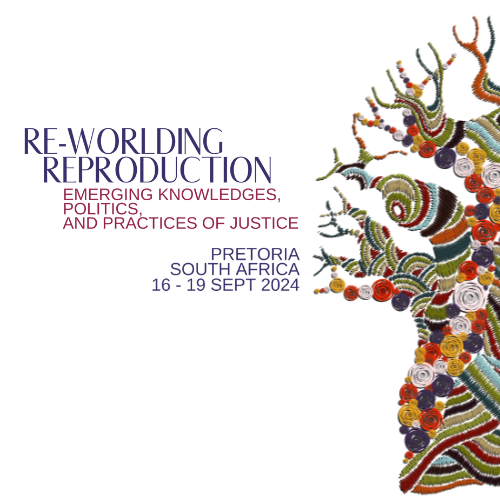Call for Papers
Reproduction entails practices of life-making and life-sustaining toward imagined future worlds. Reproduction is integral to contemporary politics, involving contestations across the globe about reproductive practices, how to sustain habitable and dignified life, and what the future world should look like. Reproduction is central to social, political, and economic life and central to social analysis and social theory, covering issues as varied as the rights to abortion and contraception, the medicalisation of birth, the rights of queer families, assisted reproductive technologies, race and class in reproductive labour, and the economic and racial stratification of reproductive health.
But which scholars and whose reproductive lives are centred? These questions challenge us to rethink the conceptual toolkit of social theory. From where we are situated in Southern Africa, reproduction often remains overdetermined by powerful and moralising frameworks within biomedicine, global health, development, and climate change. This conference presents an opportunity to reconsider US and Eurocentric hegemony in the production of knowledge within reproductive studies.
This international conference aims to include a multiplicity of reproductive worlds, practices, and futures, alongside a reflexive analysis of the structures and politics that shape reproductive studies itself. The title of the conference takes its name from Sabelo J Ndlovu-Gatsheni’s (2023) recent essay, where he points to the reproduction of the “coloniser’s model of the world” through a cognitive empire. We take inspiration from his appeal to “re-world” from the Global South, a process and practice of world-making (worlding) via “knowledge, power, resistance, and dreams of freedom.” We welcome contributions across a range of disciplines in reproductive studies, including anthropology, sociology, public health, science and technology studies, and queer, ethnic, and gender studies. We aim to foreground Global South scholarship, their/our contributions to challenging hegemonic framings of reproduction in social theory, and highlighting work that disrupts powerful narratives in biomedicine, health policy, and social discourse.
We invite submissions in the following formats:
- Papers by single or multiple authors. Submissions shall require abstracts of max. 250 words and indicate which of the questions below the paper addresses.
- Closed panels with between 3 and 5 speakers and a discussant. Submissions include a panel theme description of max. 150 words, abstract and speaker details for each presentation in the panel, and details of discussant.
- Roundtables with 1 discussant and between 2 and 7 presenters. We invite roundtable submissions for scholars, artists, activists, practitioners, or those working in non-governmental organisations, policy, or advocacy. Roundtables do not require formal papers and have conversation and discussion as their aim. Roundtables shall be about 1 hour – 90 minutes. Submissions include title and abstract of max. 250 words and speaker details for all presenters and discussant.
We will be running parallel sessions. Submissions should address one of the following themes:
- Reproductive knowledges: How are ‘new’ and ‘old’ knowledges of reproduction (re)shaping practices of life-making and life-sustaining? How do we challenge the colonial conceptual apparatus toward more just reproductive futures?
- Rights, justice, ethics: What are the enduring challenges to movements for reproductive justice and rights? And how are communities, such as LGBTQI+ and queer communities, those with disabilities, marginalised racial and ethnic groups, among others, navigating and envisioning reproductive justice?
- (In)fertile environments: How are ecological challenges affecting reproduction and reproductive futures? How are people sustaining and remaking social ties, kin, and generations in contexts of changing environments?
- Globalisation, mobilities, and markets: How are the legacies of colonialism and racial capitalism remade in contemporary reproductive markets? What new forms of reproductive labour are emerging?
- Race, nation, and governance: How can new knowledges of reproduction in the South challenge oppressive forms of reproductive governance? What are the dominating discourses, in media and otherwise, that shape and/or reflect ideologies of race, nation and family?
- Kin and care: How are kin and care networks dynamically remade and stretched within precarious contexts? What new forms of kin-making challenge and remake reproductive norms?
All submissions are due 15 February 2024. Please visit our FAQ page for information, such as scholarships, language of presentation, and on our plans for an Early Career Scholar Workshop. For any further questions, please contact [email protected].
- Conference Duration
- 16 September 2024 09:00 - 19 September 2024 17:00
- Registration
- 1 March 2024 - 30 June 2024 [CLOSED]
- Call For Abstracts
- 27 November 2023 - 14 May 2024

- Name
- Ms C Visagie
- Contact Email
- [email protected]
- Contact Number
- 0832310393